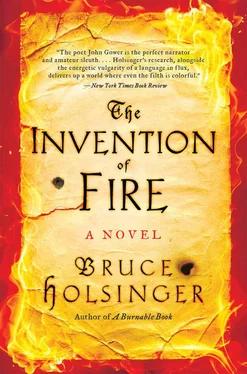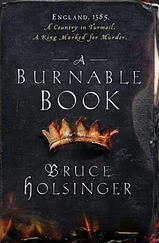Bruce Holsinger - The Invention of Fire
Здесь есть возможность читать онлайн «Bruce Holsinger - The Invention of Fire» — ознакомительный отрывок электронной книги совершенно бесплатно, а после прочтения отрывка купить полную версию. В некоторых случаях можно слушать аудио, скачать через торрент в формате fb2 и присутствует краткое содержание. Год выпуска: 2015, Издательство: HarperCollins, Жанр: Исторический детектив, на английском языке. Описание произведения, (предисловие) а так же отзывы посетителей доступны на портале библиотеки ЛибКат.
- Название:The Invention of Fire
- Автор:
- Издательство:HarperCollins
- Жанр:
- Год:2015
- ISBN:нет данных
- Рейтинг книги:3 / 5. Голосов: 1
-
Избранное:Добавить в избранное
- Отзывы:
-
Ваша оценка:
- 60
- 1
- 2
- 3
- 4
- 5
The Invention of Fire: краткое содержание, описание и аннотация
Предлагаем к чтению аннотацию, описание, краткое содержание или предисловие (зависит от того, что написал сам автор книги «The Invention of Fire»). Если вы не нашли необходимую информацию о книге — напишите в комментариях, мы постараемся отыскать её.
The Invention of Fire — читать онлайн ознакомительный отрывок
Ниже представлен текст книги, разбитый по страницам. Система сохранения места последней прочитанной страницы, позволяет с удобством читать онлайн бесплатно книгу «The Invention of Fire», без необходимости каждый раз заново искать на чём Вы остановились. Поставьте закладку, и сможете в любой момент перейти на страницу, на которой закончили чтение.
Интервал:
Закладка:
With the swords it wouldn’t be an even fight, nor a long one, but it could be messy. The Tower men knew it. They left the foundry spitting oaths. “We’ll be back for him, widow. You can wager on it. We’ll be back.”
The next visitor arrived the following morning. He appeared not at the foundry but at the house, knocking on the street door and asking for Hawisia by name. A servant came to her in the shop. She went through to the hall, where the man had been asked to wait for the mistress.
She saw John Gower standing by the glazed window in front, the Stone hours in his hand, opened to a thumb-rubbed painting of the Virgin and Child. She had not noted his height at his last visit. He was taller than her husband had been and a sight older, and though his hair had greyed he was not frail in any way. On his head he wore a plain and unfashionable cap of banded wool, something you might see on a middling mercer, and when he turned to her the tassels bounced on either side of his eyes.
There was something missing in those eyes. Not kindness, as his look was clear and open. Unfocused and vague, his eyes wandered left and right before settling on her, then crinkling at the sides, lifted by a good-hearted smile.
“Mistress Stone,” he said. “I am here about Stephen Marsh.”
“You and half of London alike, it seems,” she said, leaning her broad hips against the central table, trying to sound hard. “What is it you want with me?”
“Merely to give you this.” He held out a parchment. She took it from him, not daring to hope, though she was unable to read the clerical hand when she unfurled the thing. From it dangled a wax seal pendant on a strip of parchment tied to the main body of the document.
“It is a pardon, Mistress Heath,” he said.
She stared at it.
“It pardons your man Stephen Marsh in the death of Eleanor Baxter of Ware. King Richard declares the matter an unfortunate accident, and proclaims the inestimable value of Marsh’s service to the realm as adequate recompense for the death. I can translate the wording for you if you like.”
“Please,” she said, because she could find nothing else to say. She gave it back to him.
He took out an odd instrument of glass and lead, unfolded it, and set it on his nose. “It begins, ‘ Know all present and to come that I, Richard, king by the grace of God, in the tenth year of my reign, do grant unto Stephen Marsh, founder and smith of Aldgate Ward in the parish of St. Mary’s, full and complete pardon . . . ’”
He went on, and though she lost the trail of his words she understood where they led. When Gower had finished she said, “Stephen hasn’t been taken in yet, nor is there an indictment for murder.”
“Nor will there be,” said Gower. “The royal pardon may come before arrest, after conviction, at the gallows-anywhere His Royal Highness wishes it to come. King Richard seals many dozens of them every month. This one required little persuasion.”
Hawisia shook her head, staring at the magic writing on the parchment. “A great power for a man to wield, even a king,” she mused.
“I believe the king’s power should best be used according to law,” he said stiffly, “and to speak truthfully, I have difficulty with the royal prerogative if exercised too freely. Yet there are certain circumstances in which the law must yield to the pardon and pity of the king. This is one of them.”
“You are King Richard’s agent, then?”
He smiled. “Hardly, Mistress Stone.”
“Then how is it that you speak with his voice?”
He considered his response. “The royal court is a diverse hive. Not all who labor there are unthinking drones. There are good men within those high walls, men who can be made or paid to listen to intercessors.”
“You were the intercessor? For our Stephen?”
“A friend of mine was happy to intercede, on my word.”
“But why?”
“I learned of Marsh’s work at firsthand. Once in Calais, then again during Exton’s Riding.”
“You were there.”
“I was.”
“At the gate?”
“Yes, mistress.” He hesitated. “I have fired similar handgonnes myself. I know what Stephen must have done, and believe I know how he did it. He saved innumerable lives, Mistress Stone. Important lives. Now he must work to preserve his own.”
“He is in danger?”
“I don’t know,” Gower confessed. “A royal pardon promises that Stephen will not die at the hands of the king, hung on a common gibbet. As for William Snell and the Tower guard . . . that I cannot say. With the death of Edmund Rune the king’s armorer has escaped penalty. There is no good evidence against him, only rumor, and the crown is content with laying all of this on the chancellor’s deceased counselor. Things will be cleaner that way, I suppose,” he mused. “But Stephen Marsh will end this affair with a new and powerful enemy.”
“At all rates,” said Hawisia. To her the names and offices meant nothing, and she wished to hear no more about them. She reached out to press her hands to his. “God be thanked for this, and for you, Master Gower.”
He left Stone’s without laying those peculiar eyes on Stephen Marsh, the man whose pardon he had somehow conjured from the king’s chancery. When he had gone Hawisia went out to the ’prentice barn and hollered for him. He looked fearful when he emerged, as if expecting arrest, and squinted in the unfamiliar light.
She handed him the pardon. He looked at it and handled it as delicately as he did her daughter. He fingered the king’s seals, his fingertips whispering along the parchment. He could read the thing no better than she could, though she could tell he knew what it promised.
“But how-?”
“A mystery,” she said. “One we should accept as a sign of God’s grace, and a seal of his charity. Now we must live and work for the new moment we’ve been given.”
“Aye, Mistress Stone.”
“And in this moment, we have four bells to fashion. Two for the Charterhouse, one for All Hallows-on-the-Wall, and another for the east belfry at St. Alfege. You are ready for a return to your work, Stephen?”
“I am,” he said, his voice gaining in confidence. “And to earn your trust.”
“Oh, you have it, Stephen Marsh,” she said, walking within to get her daughter. “You have it in full.”
Later she watched him oversee the first pour. Two cautious apprentices, aproned and gloved, tipped out the bronze ore, a cauldron of fire flowing into the clay molds, hissing through the wax. Like pouring out the sun, and the sun brings death but life as well, as Hawisia Stone saw it. Someday, perhaps, Stephen Marsh might see it, too.
Chapter 50
For a moment, at least, it seemed I had Chaucer’s unalloyed attention. I read. He listened.
“For Love is blind and may not see;
Therefore may we no certainty
Set upon his foul judgment,
But as the wheel about doth wend
He gives his small grace undeserved;
And from that man who has him served
Full oft he taketh all his fold,
As cutpurse stealeth groat and gold.
Yet nonetheless there is no man
In all this world who may withstand
His wrath. Now may we hope full fair
To witness peace and end of war,
And seek for remedy of Love
Where saints doth tread, our souls to move.”
I stopped there. The lines came from a long lover’s confession I had been writing for some months, inspired by a royal encounter on the river the year before. During my short ride out to Greenwich that morning I had recited the lines to myself with a modest pride in my making, though now that I sat with Chaucer in his hearth-warmed hall my couplets sounded plain and empty to my ear. A cold night, bleak verse, weak ale: I found myself wishing I had remained in Southwark.
Читать дальшеИнтервал:
Закладка:
Похожие книги на «The Invention of Fire»
Представляем Вашему вниманию похожие книги на «The Invention of Fire» списком для выбора. Мы отобрали схожую по названию и смыслу литературу в надежде предоставить читателям больше вариантов отыскать новые, интересные, ещё непрочитанные произведения.
Обсуждение, отзывы о книге «The Invention of Fire» и просто собственные мнения читателей. Оставьте ваши комментарии, напишите, что Вы думаете о произведении, его смысле или главных героях. Укажите что конкретно понравилось, а что нет, и почему Вы так считаете.












